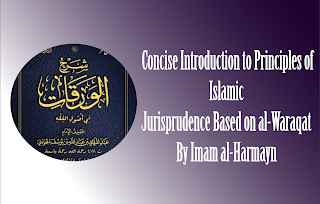Concise Introduction to Principles of Islamic Jurisprudence Based on al-Waraqat by Imam al-Juwayni [Part 7]
• Prohibition is a statement that someone of a superior position issues to someone of an inferior position, obliging him to refrain from doing something. If the prohibited matter is done, then it is invalid. For example, it is prohibited to pray without purification. If someone prays without purification then his prayer is invalid.
• A command may indicate: 1) permissibility. For example, in the Arabic version of ayah [2] surah al-Ma’dah, the ayah reads as follows: ‘When you have left the state of pilgrim sanctity, then hunt.’ The intended meaning is that it is permissible for the believers to hunt after performing the pilgrimage and they are out of the state of ihram. 2) threatening. For example, in the Arabic version of ayah [40] surah Fussilat, the ayah reads as follows: ‘Do what you want.’ The intended meaning is threatening, i.e. do what you want, and you will suffer severe punishment for your evil deeds. 3) It is equal (the same) to do or not do something. The Arabic version of ayah [16] surah at-Tur, reads as follows: ‘Burn therein. Whether you will be patient or impatient, it will be the same for you…’ The intended meaning is that the disbelievers will burn in Hell whether they will be patient or impatient. 4) commanding the existence of something. [We said, ‘O fire! Be coolness and safety for Ibrahim.] [Surah al-Anbiya: 69]

No comments:
Post a Comment